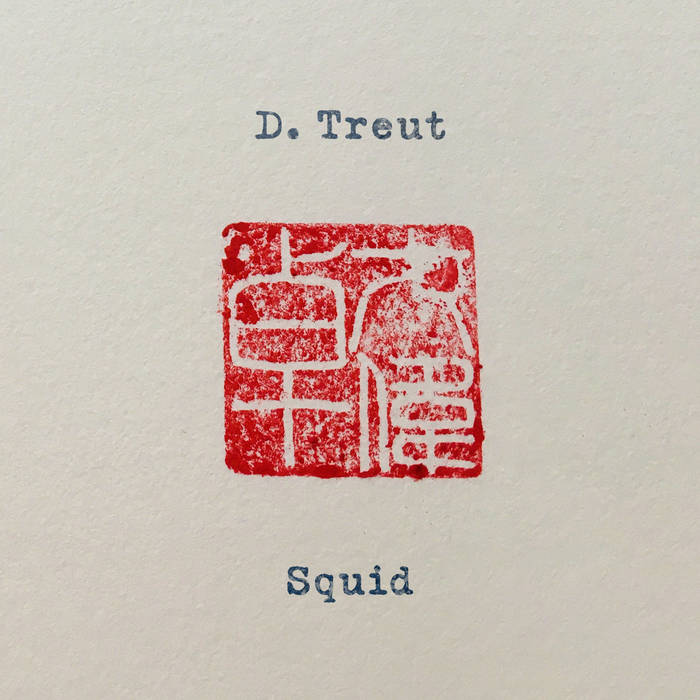The world needs people like Dave Treut. A powerful presence as a multi-instrumentalist/composer, he creates resolutely eccentric music that shows a sincere appreciation of life and its many absurdities. Treut (often credited as D.Treut) is a larger-than-life character and a force of positivity, and this all comes shining through in his music. But to date, his recorded output is comparatively small – we could always use more. The release of Squid, recorded back in 2004, is a welcome addition to his discography and an important document of an earlier period in his career. This album shows that even two decades ago Treut was making music that manages to sound like the present day. If the world wasn’t ready for Squid then, it certainly is now.
The lineup for most of Squid is a quartet with Treut on drums, Rob Jost on electric bass, Mike Gamble on guitar, and Jesse Neuman on trumpet and electronics. Gamble and Neuman each deploy a very specific palette of effects and processing – the latter’s instrument rarely sounds like a trumpet – to create a vibrantly colorful sonic landscape. This is a multifaceted album, worth checking out many times to focus on different layers of the music: the unique timbres, the rhythmic energy, the improvisation and interplay, the harmonic progressions, the surreal humor. The songs’ forms, and how the players work with them, are particularly fascinating to me. Each song is based on a relatively short, cyclic form, usually a rhythmic bass line with no specific chords. Though there are heads and solos, all four players constantly explore the songs’ myriad possibilities, at times obscuring the form only to converge again at the beginning of the next chorus. These are songs with jazz forms, but Squid doesn’t sound like any jazz album you’ve heard before. “Non genre specific”, as stated in the liner notes, seems an apt description. There’s certainly plenty of rock intensity in Treut’s drumming; when combined with the diverse timbres, there are moments that suggest Frank Zappa – but with a different attention to detail, funneled into individual and collective improvisation rather than compositional complexity. Treut’s humor is also slightly Zappa-esque, but again a shade different: a similar whimsy and sense of wonder, but with none of the irony.
The opener “Mommy” encapsulates the vast range of musics that is Squid. In the first minute, a woman’s voice accompanied by organ (both are samples of Alan Lomax field recordings) talks about finding inspiration in the beauty of life – a fitting summation of the entire album. Then the band is off on a journey through a multicolored sea of timbre and rhythm, jet-propelled by a high-energy breakbeat. The end veers off abruptly into something completely different: Treut plays a conga solo, with overdubbed congas and cowbell keeping a groove. It shouldn’t work as an ending – but it does. The band finishes its story, and the music keeps going.
“Bebop Guys” also begins with a minute of spoken word, this time a particularly absurd one with what appears to be a prank phone call from Treut over a suitably zany synth improvisation. The rest of this song picks up where the midsection of “Mommy” left off in overall vibe, but with a bit more of a metal attitude.
“Cold On The Eyes” appears in two consecutive versions. The first features the full quartet, in a slower, slightly more subdued setting than the preceding songs, though not without a generous helping of absurd timbres and vocal samples. This is followed by a solo version by Treut on vocals and acoustic guitar. His lyrics seem to highlight words that are satisfying to say together; the meaning is secondary, or at least glimpsed from a distance. Out of these songs, this one comes closest in style to Treut’s spectacular 2019 album Time’s A River.
Treut’s (and his band’s) love of life is especially on display in the last and longest track, “Jeepnie”. This fourteen-minute epic sets a deeply joyous, empowering mood throughout. It’s a wide-open dreamscape that morphs subtly between a series of extraordinarily detailed textures, some of which involve what sound like samples of children’s toys. “Jeepnie” is at once meditative and playful. Vocals, here by Michelle Casillas and Eric Biondo, come barreling in halfway through with a Shaggs-like wildness. “I saw light when you came into my life” – the lyric may sound trite but it is pure Treut. These are genuine light and genuine life we’re talking about, with all their quirks and complications.
I laughed and cried simultaneously when I first heard Squid. You may not react in exactly the same way, but the power of this music is undeniable. A character like Dave Treut is not easily forgotten, and Squid is certainly an album that will stick with you.

